Reflective Report on Leadership Theory and Practice
VerifiedAdded on 2023/06/05
|13
|3777
|483
AI Summary
This reflective report discusses the author's personal experience and journey in understanding the concept of leadership theory and practice studied during a 12-week course. The report includes a literature review on leadership styles, ethical considerations, and international leadership. The author reflects on their own ideas and recommendations based on credible sources and concludes with personal observations and findings on leadership and organizational management.
Contribute Materials
Your contribution can guide someone’s learning journey. Share your
documents today.
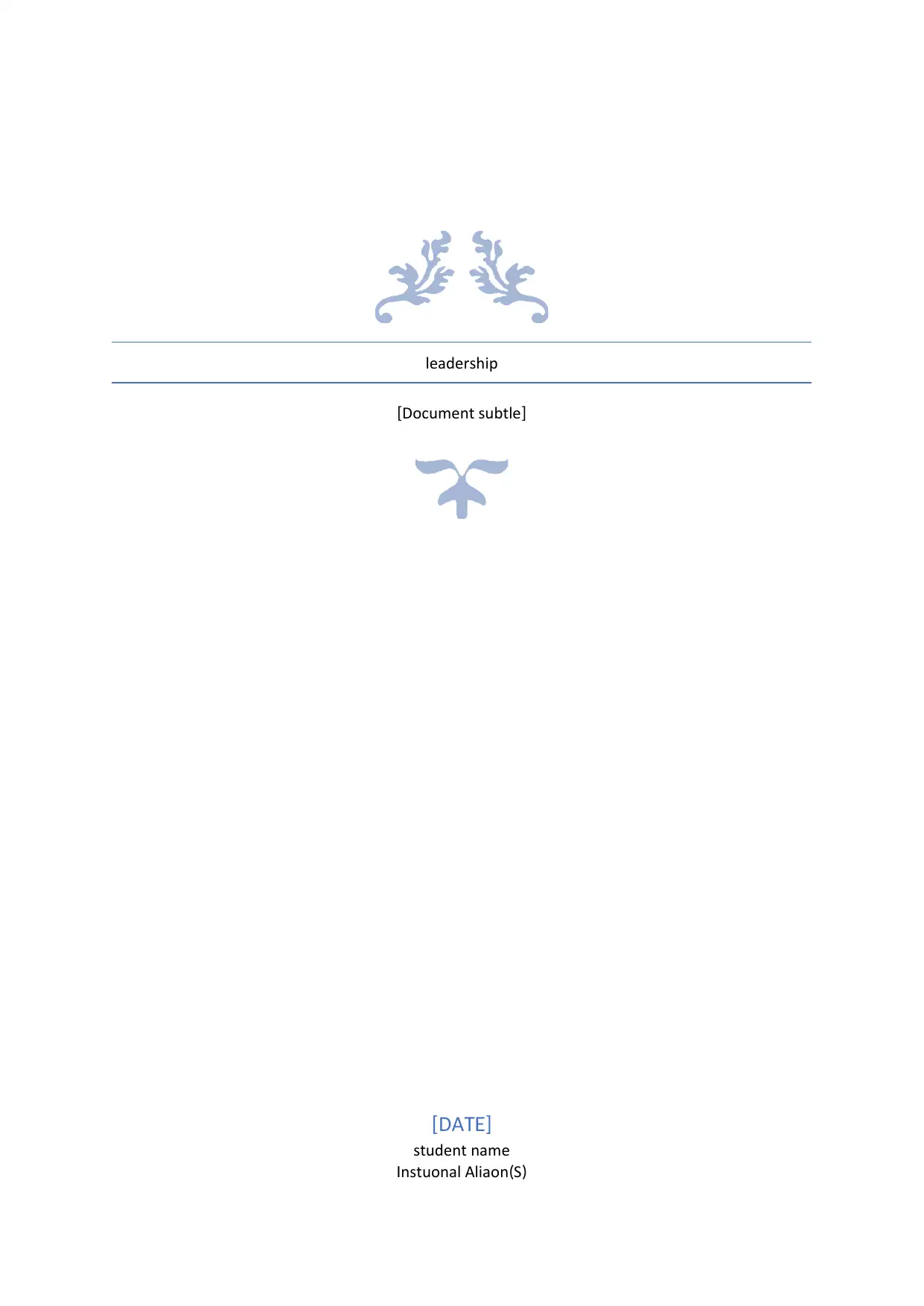
leadership
Document subtitle[ ]
DA[ TE]
student name
nstitutional Affiliation SI ( )
Document subtitle[ ]
DA[ TE]
student name
nstitutional Affiliation SI ( )
Secure Best Marks with AI Grader
Need help grading? Try our AI Grader for instant feedback on your assignments.
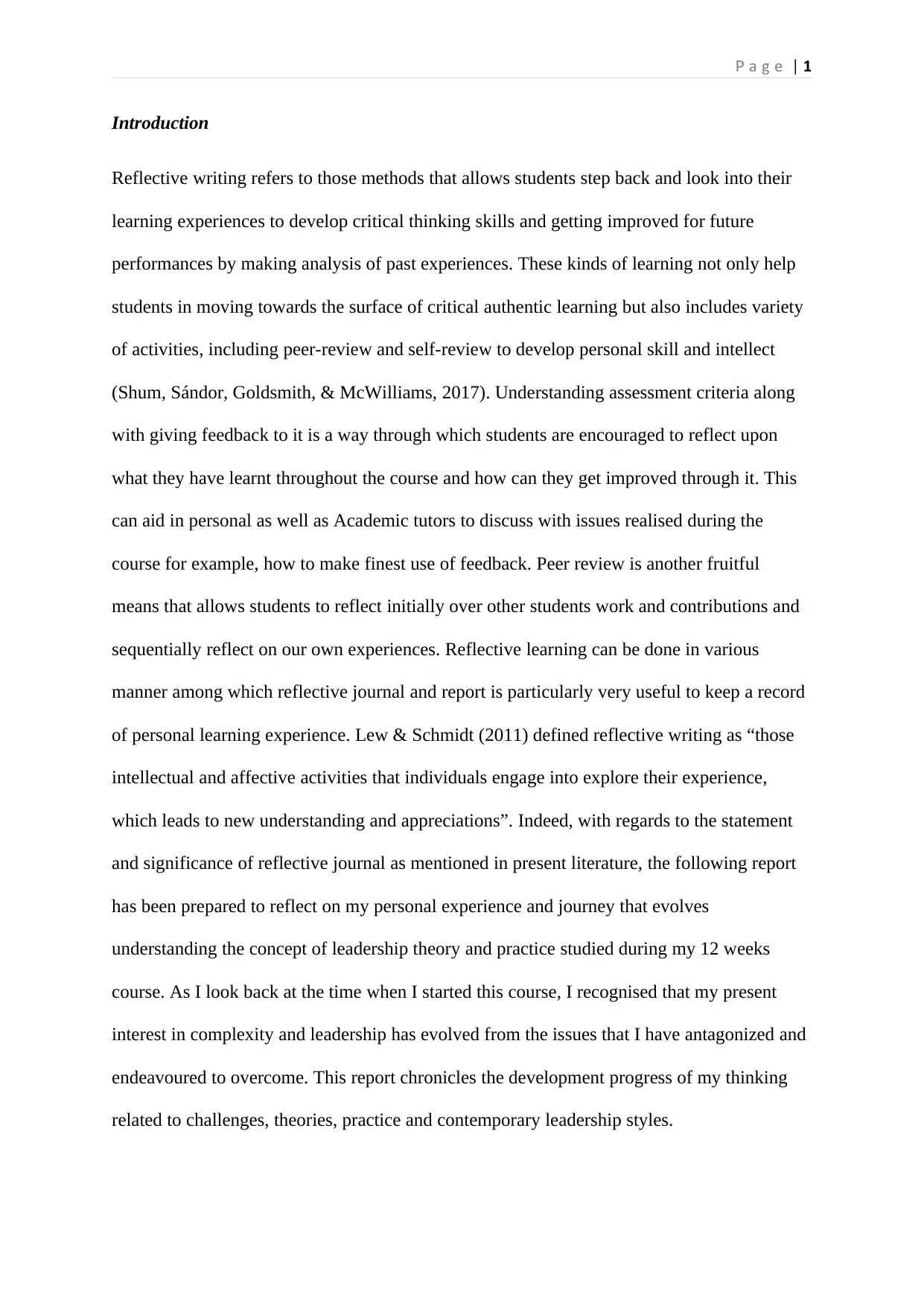
a g eP | 1
Introduction
Reflective writing refers to those methods that allows students step back and look into their
learning experiences to develop critical thinking skills and getting improved for future
performances by making analysis of past experiences. These kinds of learning not only help
students in moving towards the surface of critical authentic learning but also includes variety
of activities, including peer-review and self-review to develop personal skill and intellect
(Shum, Sándor, Goldsmith, & McWilliams, 2017). Understanding assessment criteria along
with giving feedback to it is a way through which students are encouraged to reflect upon
what they have learnt throughout the course and how can they get improved through it. This
can aid in personal as well as Academic tutors to discuss with issues realised during the
course for example, how to make finest use of feedback. Peer review is another fruitful
means that allows students to reflect initially over other students work and contributions and
sequentially reflect on our own experiences. Reflective learning can be done in various
manner among which reflective journal and report is particularly very useful to keep a record
of personal learning experience. Lew & Schmidt (2011) defined reflective writing as “those
intellectual and affective activities that individuals engage into explore their experience,
which leads to new understanding and appreciations”. Indeed, with regards to the statement
and significance of reflective journal as mentioned in present literature, the following report
has been prepared to reflect on my personal experience and journey that evolves
understanding the concept of leadership theory and practice studied during my 12 weeks
course. As I look back at the time when I started this course, I recognised that my present
interest in complexity and leadership has evolved from the issues that I have antagonized and
endeavoured to overcome. This report chronicles the development progress of my thinking
related to challenges, theories, practice and contemporary leadership styles.
Introduction
Reflective writing refers to those methods that allows students step back and look into their
learning experiences to develop critical thinking skills and getting improved for future
performances by making analysis of past experiences. These kinds of learning not only help
students in moving towards the surface of critical authentic learning but also includes variety
of activities, including peer-review and self-review to develop personal skill and intellect
(Shum, Sándor, Goldsmith, & McWilliams, 2017). Understanding assessment criteria along
with giving feedback to it is a way through which students are encouraged to reflect upon
what they have learnt throughout the course and how can they get improved through it. This
can aid in personal as well as Academic tutors to discuss with issues realised during the
course for example, how to make finest use of feedback. Peer review is another fruitful
means that allows students to reflect initially over other students work and contributions and
sequentially reflect on our own experiences. Reflective learning can be done in various
manner among which reflective journal and report is particularly very useful to keep a record
of personal learning experience. Lew & Schmidt (2011) defined reflective writing as “those
intellectual and affective activities that individuals engage into explore their experience,
which leads to new understanding and appreciations”. Indeed, with regards to the statement
and significance of reflective journal as mentioned in present literature, the following report
has been prepared to reflect on my personal experience and journey that evolves
understanding the concept of leadership theory and practice studied during my 12 weeks
course. As I look back at the time when I started this course, I recognised that my present
interest in complexity and leadership has evolved from the issues that I have antagonized and
endeavoured to overcome. This report chronicles the development progress of my thinking
related to challenges, theories, practice and contemporary leadership styles.
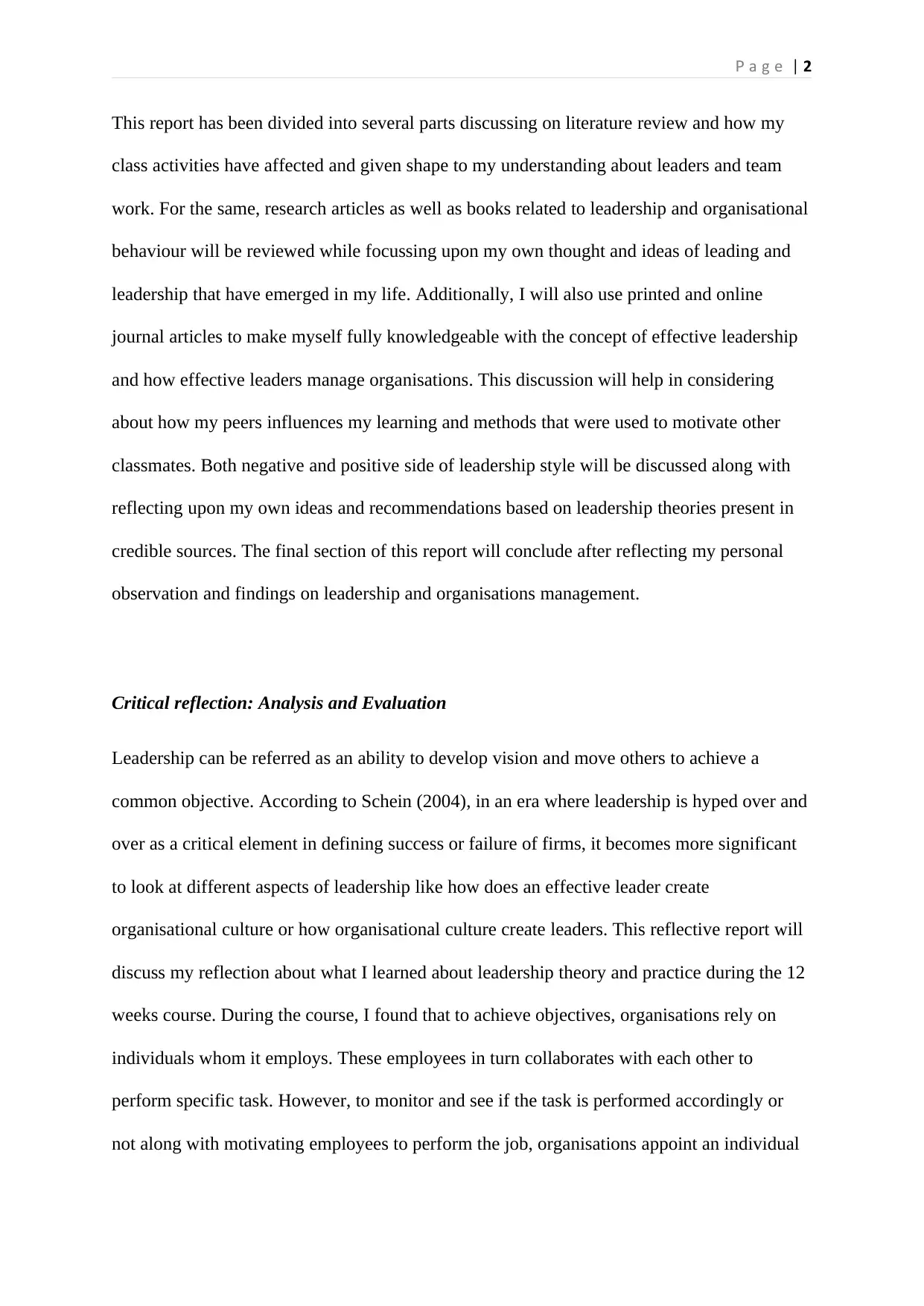
a g eP | 2
This report has been divided into several parts discussing on literature review and how my
class activities have affected and given shape to my understanding about leaders and team
work. For the same, research articles as well as books related to leadership and organisational
behaviour will be reviewed while focussing upon my own thought and ideas of leading and
leadership that have emerged in my life. Additionally, I will also use printed and online
journal articles to make myself fully knowledgeable with the concept of effective leadership
and how effective leaders manage organisations. This discussion will help in considering
about how my peers influences my learning and methods that were used to motivate other
classmates. Both negative and positive side of leadership style will be discussed along with
reflecting upon my own ideas and recommendations based on leadership theories present in
credible sources. The final section of this report will conclude after reflecting my personal
observation and findings on leadership and organisations management.
Critical reflection: Analysis and Evaluation
Leadership can be referred as an ability to develop vision and move others to achieve a
common objective. According to Schein (2004), in an era where leadership is hyped over and
over as a critical element in defining success or failure of firms, it becomes more significant
to look at different aspects of leadership like how does an effective leader create
organisational culture or how organisational culture create leaders. This reflective report will
discuss my reflection about what I learned about leadership theory and practice during the 12
weeks course. During the course, I found that to achieve objectives, organisations rely on
individuals whom it employs. These employees in turn collaborates with each other to
perform specific task. However, to monitor and see if the task is performed accordingly or
not along with motivating employees to perform the job, organisations appoint an individual
This report has been divided into several parts discussing on literature review and how my
class activities have affected and given shape to my understanding about leaders and team
work. For the same, research articles as well as books related to leadership and organisational
behaviour will be reviewed while focussing upon my own thought and ideas of leading and
leadership that have emerged in my life. Additionally, I will also use printed and online
journal articles to make myself fully knowledgeable with the concept of effective leadership
and how effective leaders manage organisations. This discussion will help in considering
about how my peers influences my learning and methods that were used to motivate other
classmates. Both negative and positive side of leadership style will be discussed along with
reflecting upon my own ideas and recommendations based on leadership theories present in
credible sources. The final section of this report will conclude after reflecting my personal
observation and findings on leadership and organisations management.
Critical reflection: Analysis and Evaluation
Leadership can be referred as an ability to develop vision and move others to achieve a
common objective. According to Schein (2004), in an era where leadership is hyped over and
over as a critical element in defining success or failure of firms, it becomes more significant
to look at different aspects of leadership like how does an effective leader create
organisational culture or how organisational culture create leaders. This reflective report will
discuss my reflection about what I learned about leadership theory and practice during the 12
weeks course. During the course, I found that to achieve objectives, organisations rely on
individuals whom it employs. These employees in turn collaborates with each other to
perform specific task. However, to monitor and see if the task is performed accordingly or
not along with motivating employees to perform the job, organisations appoint an individual
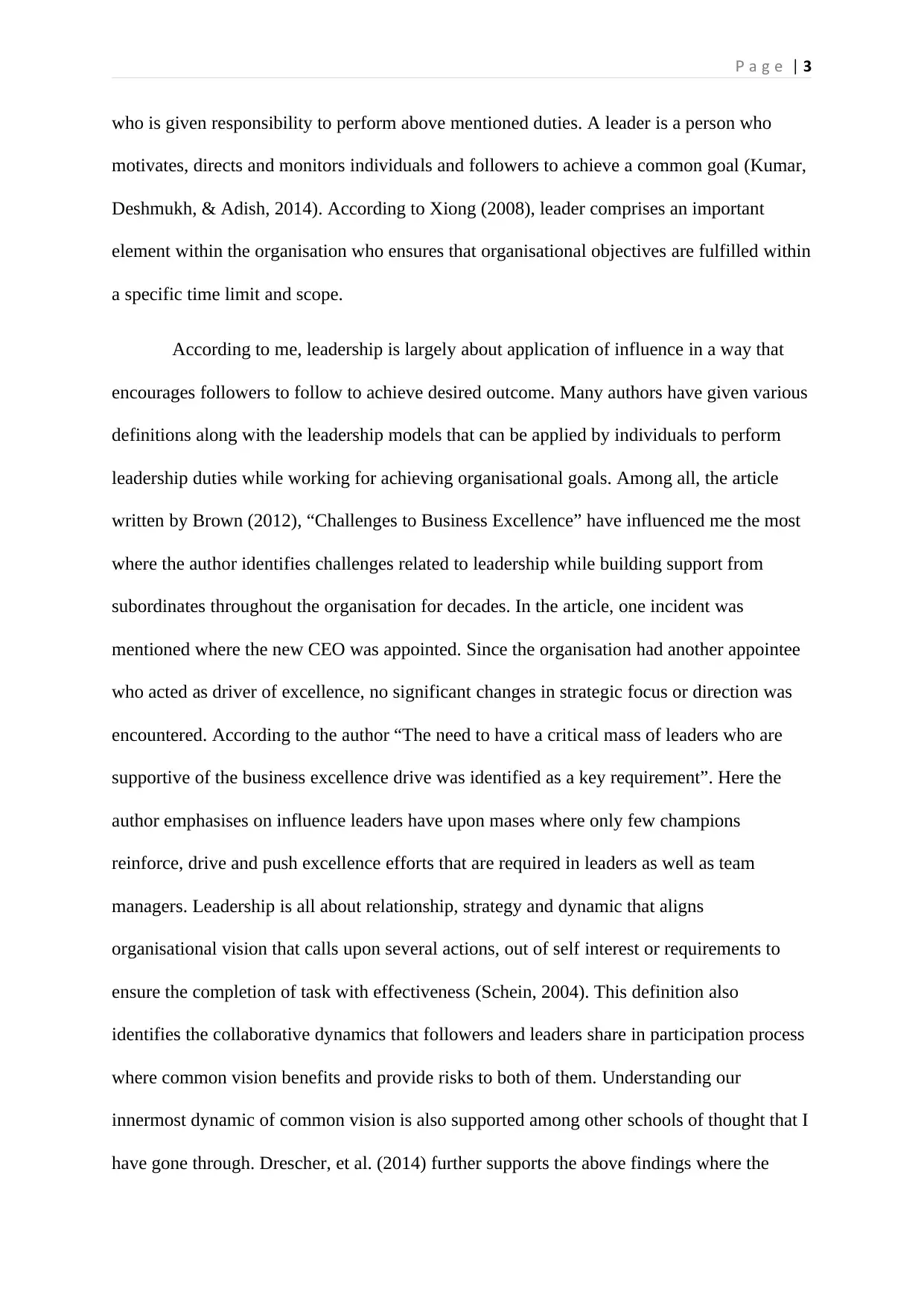
a g eP | 3
who is given responsibility to perform above mentioned duties. A leader is a person who
motivates, directs and monitors individuals and followers to achieve a common goal (Kumar,
Deshmukh, & Adish, 2014). According to Xiong (2008), leader comprises an important
element within the organisation who ensures that organisational objectives are fulfilled within
a specific time limit and scope.
According to me, leadership is largely about application of influence in a way that
encourages followers to follow to achieve desired outcome. Many authors have given various
definitions along with the leadership models that can be applied by individuals to perform
leadership duties while working for achieving organisational goals. Among all, the article
written by Brown (2012), “Challenges to Business Excellence” have influenced me the most
where the author identifies challenges related to leadership while building support from
subordinates throughout the organisation for decades. In the article, one incident was
mentioned where the new CEO was appointed. Since the organisation had another appointee
who acted as driver of excellence, no significant changes in strategic focus or direction was
encountered. According to the author “The need to have a critical mass of leaders who are
supportive of the business excellence drive was identified as a key requirement”. Here the
author emphasises on influence leaders have upon mases where only few champions
reinforce, drive and push excellence efforts that are required in leaders as well as team
managers. Leadership is all about relationship, strategy and dynamic that aligns
organisational vision that calls upon several actions, out of self interest or requirements to
ensure the completion of task with effectiveness (Schein, 2004). This definition also
identifies the collaborative dynamics that followers and leaders share in participation process
where common vision benefits and provide risks to both of them. Understanding our
innermost dynamic of common vision is also supported among other schools of thought that I
have gone through. Drescher, et al. (2014) further supports the above findings where the
who is given responsibility to perform above mentioned duties. A leader is a person who
motivates, directs and monitors individuals and followers to achieve a common goal (Kumar,
Deshmukh, & Adish, 2014). According to Xiong (2008), leader comprises an important
element within the organisation who ensures that organisational objectives are fulfilled within
a specific time limit and scope.
According to me, leadership is largely about application of influence in a way that
encourages followers to follow to achieve desired outcome. Many authors have given various
definitions along with the leadership models that can be applied by individuals to perform
leadership duties while working for achieving organisational goals. Among all, the article
written by Brown (2012), “Challenges to Business Excellence” have influenced me the most
where the author identifies challenges related to leadership while building support from
subordinates throughout the organisation for decades. In the article, one incident was
mentioned where the new CEO was appointed. Since the organisation had another appointee
who acted as driver of excellence, no significant changes in strategic focus or direction was
encountered. According to the author “The need to have a critical mass of leaders who are
supportive of the business excellence drive was identified as a key requirement”. Here the
author emphasises on influence leaders have upon mases where only few champions
reinforce, drive and push excellence efforts that are required in leaders as well as team
managers. Leadership is all about relationship, strategy and dynamic that aligns
organisational vision that calls upon several actions, out of self interest or requirements to
ensure the completion of task with effectiveness (Schein, 2004). This definition also
identifies the collaborative dynamics that followers and leaders share in participation process
where common vision benefits and provide risks to both of them. Understanding our
innermost dynamic of common vision is also supported among other schools of thought that I
have gone through. Drescher, et al. (2014) further supports the above findings where the
Secure Best Marks with AI Grader
Need help grading? Try our AI Grader for instant feedback on your assignments.
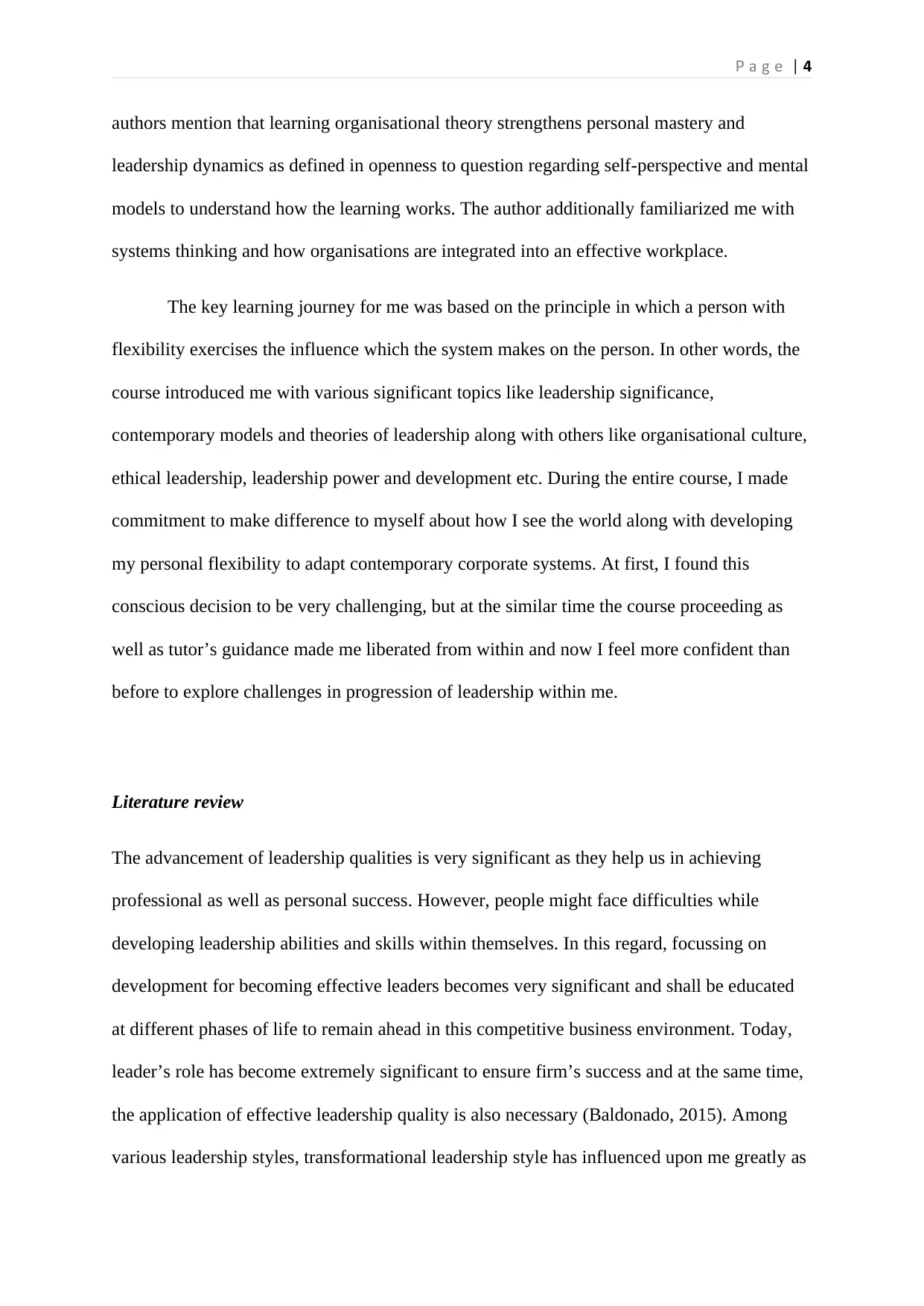
a g eP | 4
authors mention that learning organisational theory strengthens personal mastery and
leadership dynamics as defined in openness to question regarding self-perspective and mental
models to understand how the learning works. The author additionally familiarized me with
systems thinking and how organisations are integrated into an effective workplace.
The key learning journey for me was based on the principle in which a person with
flexibility exercises the influence which the system makes on the person. In other words, the
course introduced me with various significant topics like leadership significance,
contemporary models and theories of leadership along with others like organisational culture,
ethical leadership, leadership power and development etc. During the entire course, I made
commitment to make difference to myself about how I see the world along with developing
my personal flexibility to adapt contemporary corporate systems. At first, I found this
conscious decision to be very challenging, but at the similar time the course proceeding as
well as tutor’s guidance made me liberated from within and now I feel more confident than
before to explore challenges in progression of leadership within me.
Literature review
The advancement of leadership qualities is very significant as they help us in achieving
professional as well as personal success. However, people might face difficulties while
developing leadership abilities and skills within themselves. In this regard, focussing on
development for becoming effective leaders becomes very significant and shall be educated
at different phases of life to remain ahead in this competitive business environment. Today,
leader’s role has become extremely significant to ensure firm’s success and at the same time,
the application of effective leadership quality is also necessary (Baldonado, 2015). Among
various leadership styles, transformational leadership style has influenced upon me greatly as
authors mention that learning organisational theory strengthens personal mastery and
leadership dynamics as defined in openness to question regarding self-perspective and mental
models to understand how the learning works. The author additionally familiarized me with
systems thinking and how organisations are integrated into an effective workplace.
The key learning journey for me was based on the principle in which a person with
flexibility exercises the influence which the system makes on the person. In other words, the
course introduced me with various significant topics like leadership significance,
contemporary models and theories of leadership along with others like organisational culture,
ethical leadership, leadership power and development etc. During the entire course, I made
commitment to make difference to myself about how I see the world along with developing
my personal flexibility to adapt contemporary corporate systems. At first, I found this
conscious decision to be very challenging, but at the similar time the course proceeding as
well as tutor’s guidance made me liberated from within and now I feel more confident than
before to explore challenges in progression of leadership within me.
Literature review
The advancement of leadership qualities is very significant as they help us in achieving
professional as well as personal success. However, people might face difficulties while
developing leadership abilities and skills within themselves. In this regard, focussing on
development for becoming effective leaders becomes very significant and shall be educated
at different phases of life to remain ahead in this competitive business environment. Today,
leader’s role has become extremely significant to ensure firm’s success and at the same time,
the application of effective leadership quality is also necessary (Baldonado, 2015). Among
various leadership styles, transformational leadership style has influenced upon me greatly as
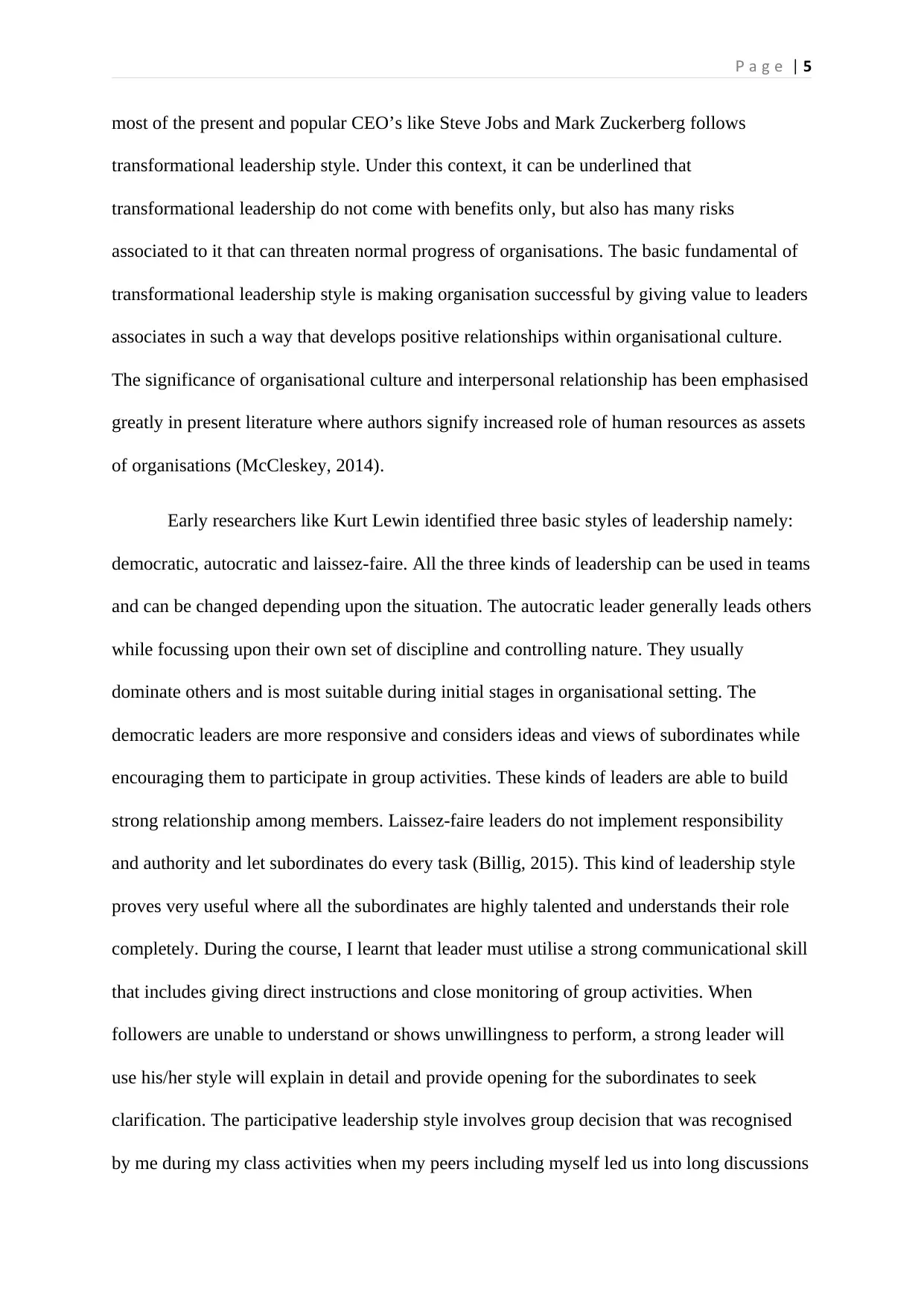
a g eP | 5
most of the present and popular CEO’s like Steve Jobs and Mark Zuckerberg follows
transformational leadership style. Under this context, it can be underlined that
transformational leadership do not come with benefits only, but also has many risks
associated to it that can threaten normal progress of organisations. The basic fundamental of
transformational leadership style is making organisation successful by giving value to leaders
associates in such a way that develops positive relationships within organisational culture.
The significance of organisational culture and interpersonal relationship has been emphasised
greatly in present literature where authors signify increased role of human resources as assets
of organisations (McCleskey, 2014).
Early researchers like Kurt Lewin identified three basic styles of leadership namely:
democratic, autocratic and laissez-faire. All the three kinds of leadership can be used in teams
and can be changed depending upon the situation. The autocratic leader generally leads others
while focussing upon their own set of discipline and controlling nature. They usually
dominate others and is most suitable during initial stages in organisational setting. The
democratic leaders are more responsive and considers ideas and views of subordinates while
encouraging them to participate in group activities. These kinds of leaders are able to build
strong relationship among members. Laissez-faire leaders do not implement responsibility
and authority and let subordinates do every task (Billig, 2015). This kind of leadership style
proves very useful where all the subordinates are highly talented and understands their role
completely. During the course, I learnt that leader must utilise a strong communicational skill
that includes giving direct instructions and close monitoring of group activities. When
followers are unable to understand or shows unwillingness to perform, a strong leader will
use his/her style will explain in detail and provide opening for the subordinates to seek
clarification. The participative leadership style involves group decision that was recognised
by me during my class activities when my peers including myself led us into long discussions
most of the present and popular CEO’s like Steve Jobs and Mark Zuckerberg follows
transformational leadership style. Under this context, it can be underlined that
transformational leadership do not come with benefits only, but also has many risks
associated to it that can threaten normal progress of organisations. The basic fundamental of
transformational leadership style is making organisation successful by giving value to leaders
associates in such a way that develops positive relationships within organisational culture.
The significance of organisational culture and interpersonal relationship has been emphasised
greatly in present literature where authors signify increased role of human resources as assets
of organisations (McCleskey, 2014).
Early researchers like Kurt Lewin identified three basic styles of leadership namely:
democratic, autocratic and laissez-faire. All the three kinds of leadership can be used in teams
and can be changed depending upon the situation. The autocratic leader generally leads others
while focussing upon their own set of discipline and controlling nature. They usually
dominate others and is most suitable during initial stages in organisational setting. The
democratic leaders are more responsive and considers ideas and views of subordinates while
encouraging them to participate in group activities. These kinds of leaders are able to build
strong relationship among members. Laissez-faire leaders do not implement responsibility
and authority and let subordinates do every task (Billig, 2015). This kind of leadership style
proves very useful where all the subordinates are highly talented and understands their role
completely. During the course, I learnt that leader must utilise a strong communicational skill
that includes giving direct instructions and close monitoring of group activities. When
followers are unable to understand or shows unwillingness to perform, a strong leader will
use his/her style will explain in detail and provide opening for the subordinates to seek
clarification. The participative leadership style involves group decision that was recognised
by me during my class activities when my peers including myself led us into long discussions
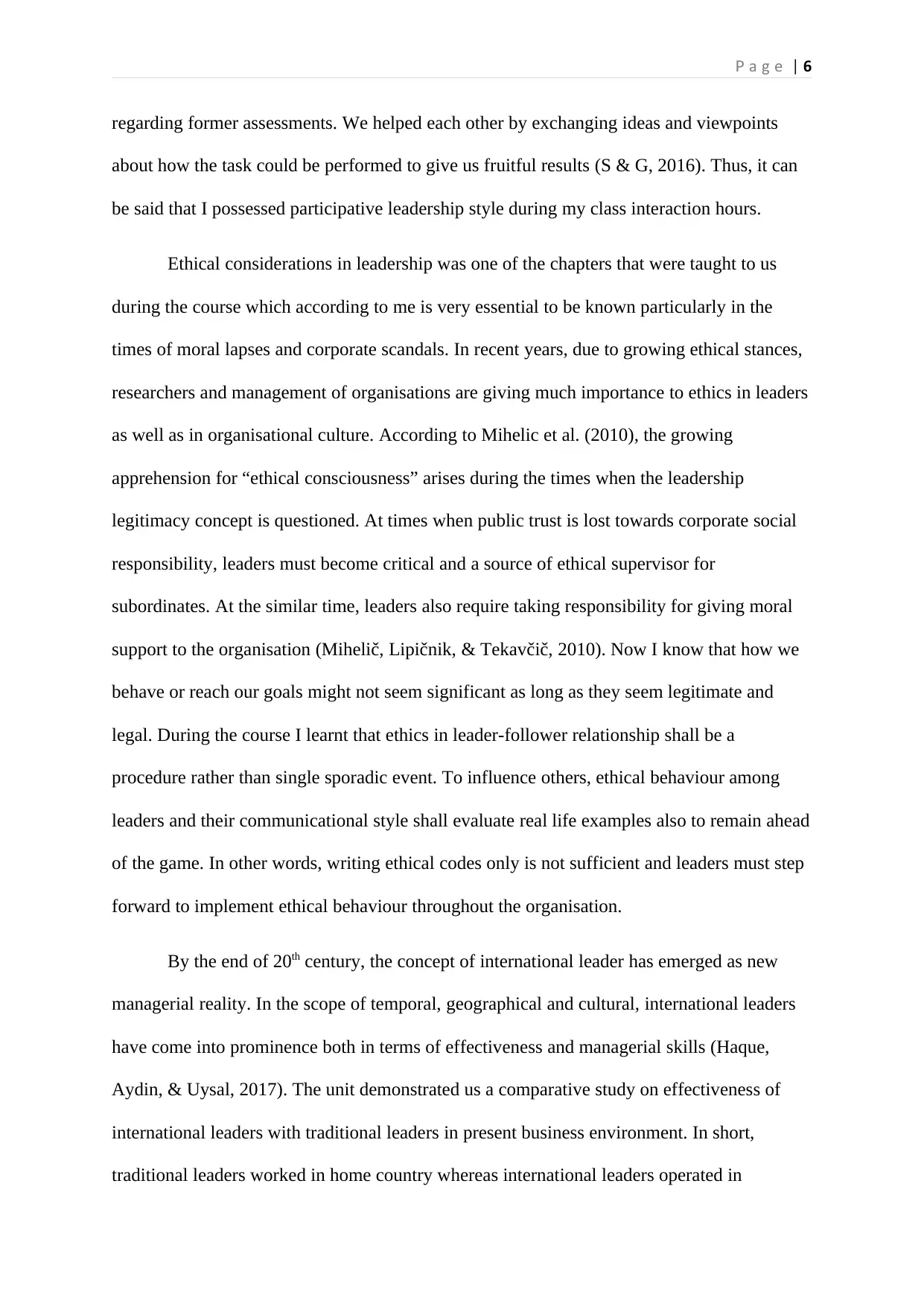
a g eP | 6
regarding former assessments. We helped each other by exchanging ideas and viewpoints
about how the task could be performed to give us fruitful results (S & G, 2016). Thus, it can
be said that I possessed participative leadership style during my class interaction hours.
Ethical considerations in leadership was one of the chapters that were taught to us
during the course which according to me is very essential to be known particularly in the
times of moral lapses and corporate scandals. In recent years, due to growing ethical stances,
researchers and management of organisations are giving much importance to ethics in leaders
as well as in organisational culture. According to Mihelic et al. (2010), the growing
apprehension for “ethical consciousness” arises during the times when the leadership
legitimacy concept is questioned. At times when public trust is lost towards corporate social
responsibility, leaders must become critical and a source of ethical supervisor for
subordinates. At the similar time, leaders also require taking responsibility for giving moral
support to the organisation (Mihelič, Lipičnik, & Tekavčič, 2010). Now I know that how we
behave or reach our goals might not seem significant as long as they seem legitimate and
legal. During the course I learnt that ethics in leader-follower relationship shall be a
procedure rather than single sporadic event. To influence others, ethical behaviour among
leaders and their communicational style shall evaluate real life examples also to remain ahead
of the game. In other words, writing ethical codes only is not sufficient and leaders must step
forward to implement ethical behaviour throughout the organisation.
By the end of 20th century, the concept of international leader has emerged as new
managerial reality. In the scope of temporal, geographical and cultural, international leaders
have come into prominence both in terms of effectiveness and managerial skills (Haque,
Aydin, & Uysal, 2017). The unit demonstrated us a comparative study on effectiveness of
international leaders with traditional leaders in present business environment. In short,
traditional leaders worked in home country whereas international leaders operated in
regarding former assessments. We helped each other by exchanging ideas and viewpoints
about how the task could be performed to give us fruitful results (S & G, 2016). Thus, it can
be said that I possessed participative leadership style during my class interaction hours.
Ethical considerations in leadership was one of the chapters that were taught to us
during the course which according to me is very essential to be known particularly in the
times of moral lapses and corporate scandals. In recent years, due to growing ethical stances,
researchers and management of organisations are giving much importance to ethics in leaders
as well as in organisational culture. According to Mihelic et al. (2010), the growing
apprehension for “ethical consciousness” arises during the times when the leadership
legitimacy concept is questioned. At times when public trust is lost towards corporate social
responsibility, leaders must become critical and a source of ethical supervisor for
subordinates. At the similar time, leaders also require taking responsibility for giving moral
support to the organisation (Mihelič, Lipičnik, & Tekavčič, 2010). Now I know that how we
behave or reach our goals might not seem significant as long as they seem legitimate and
legal. During the course I learnt that ethics in leader-follower relationship shall be a
procedure rather than single sporadic event. To influence others, ethical behaviour among
leaders and their communicational style shall evaluate real life examples also to remain ahead
of the game. In other words, writing ethical codes only is not sufficient and leaders must step
forward to implement ethical behaviour throughout the organisation.
By the end of 20th century, the concept of international leader has emerged as new
managerial reality. In the scope of temporal, geographical and cultural, international leaders
have come into prominence both in terms of effectiveness and managerial skills (Haque,
Aydin, & Uysal, 2017). The unit demonstrated us a comparative study on effectiveness of
international leaders with traditional leaders in present business environment. In short,
traditional leaders worked in home country whereas international leaders operated in
Paraphrase This Document
Need a fresh take? Get an instant paraphrase of this document with our AI Paraphraser
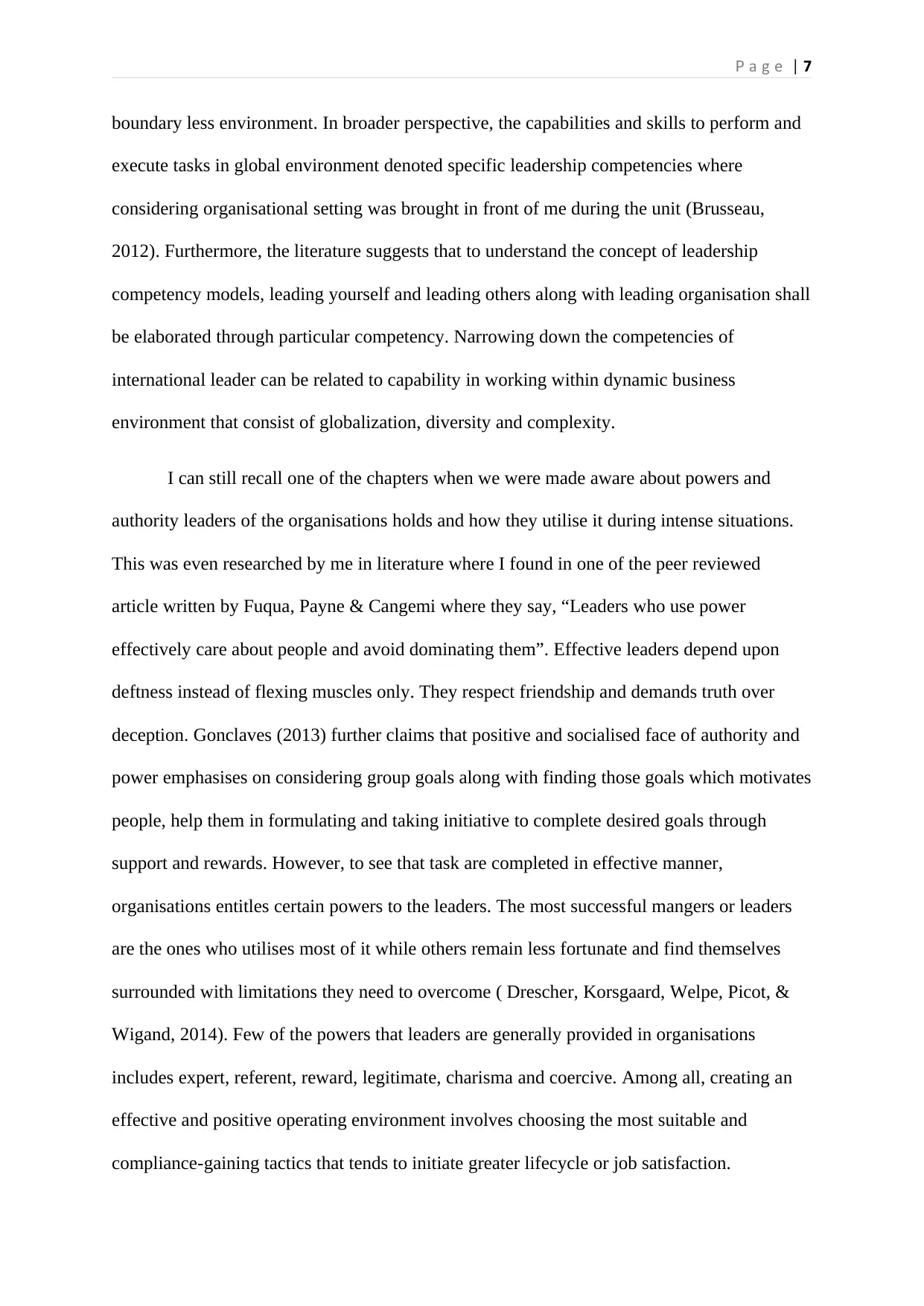
a g eP | 7
boundary less environment. In broader perspective, the capabilities and skills to perform and
execute tasks in global environment denoted specific leadership competencies where
considering organisational setting was brought in front of me during the unit (Brusseau,
2012). Furthermore, the literature suggests that to understand the concept of leadership
competency models, leading yourself and leading others along with leading organisation shall
be elaborated through particular competency. Narrowing down the competencies of
international leader can be related to capability in working within dynamic business
environment that consist of globalization, diversity and complexity.
I can still recall one of the chapters when we were made aware about powers and
authority leaders of the organisations holds and how they utilise it during intense situations.
This was even researched by me in literature where I found in one of the peer reviewed
article written by Fuqua, Payne & Cangemi where they say, “Leaders who use power
effectively care about people and avoid dominating them”. Effective leaders depend upon
deftness instead of flexing muscles only. They respect friendship and demands truth over
deception. Gonclaves (2013) further claims that positive and socialised face of authority and
power emphasises on considering group goals along with finding those goals which motivates
people, help them in formulating and taking initiative to complete desired goals through
support and rewards. However, to see that task are completed in effective manner,
organisations entitles certain powers to the leaders. The most successful mangers or leaders
are the ones who utilises most of it while others remain less fortunate and find themselves
surrounded with limitations they need to overcome ( Drescher, Korsgaard, Welpe, Picot, &
Wigand, 2014). Few of the powers that leaders are generally provided in organisations
includes expert, referent, reward, legitimate, charisma and coercive. Among all, creating an
effective and positive operating environment involves choosing the most suitable and
compliance-gaining tactics that tends to initiate greater lifecycle or job satisfaction.
boundary less environment. In broader perspective, the capabilities and skills to perform and
execute tasks in global environment denoted specific leadership competencies where
considering organisational setting was brought in front of me during the unit (Brusseau,
2012). Furthermore, the literature suggests that to understand the concept of leadership
competency models, leading yourself and leading others along with leading organisation shall
be elaborated through particular competency. Narrowing down the competencies of
international leader can be related to capability in working within dynamic business
environment that consist of globalization, diversity and complexity.
I can still recall one of the chapters when we were made aware about powers and
authority leaders of the organisations holds and how they utilise it during intense situations.
This was even researched by me in literature where I found in one of the peer reviewed
article written by Fuqua, Payne & Cangemi where they say, “Leaders who use power
effectively care about people and avoid dominating them”. Effective leaders depend upon
deftness instead of flexing muscles only. They respect friendship and demands truth over
deception. Gonclaves (2013) further claims that positive and socialised face of authority and
power emphasises on considering group goals along with finding those goals which motivates
people, help them in formulating and taking initiative to complete desired goals through
support and rewards. However, to see that task are completed in effective manner,
organisations entitles certain powers to the leaders. The most successful mangers or leaders
are the ones who utilises most of it while others remain less fortunate and find themselves
surrounded with limitations they need to overcome ( Drescher, Korsgaard, Welpe, Picot, &
Wigand, 2014). Few of the powers that leaders are generally provided in organisations
includes expert, referent, reward, legitimate, charisma and coercive. Among all, creating an
effective and positive operating environment involves choosing the most suitable and
compliance-gaining tactics that tends to initiate greater lifecycle or job satisfaction.
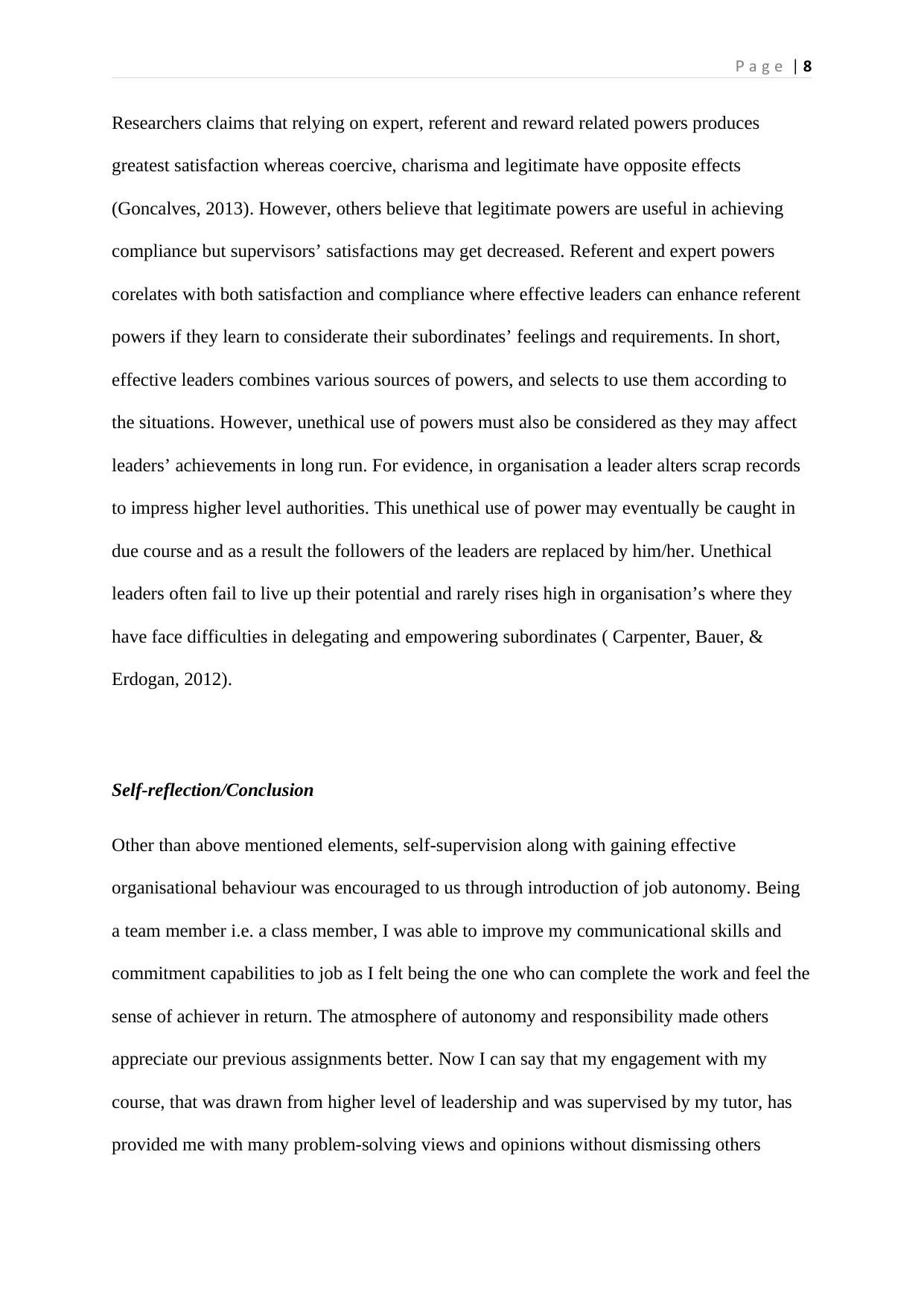
a g eP | 8
Researchers claims that relying on expert, referent and reward related powers produces
greatest satisfaction whereas coercive, charisma and legitimate have opposite effects
(Goncalves, 2013). However, others believe that legitimate powers are useful in achieving
compliance but supervisors’ satisfactions may get decreased. Referent and expert powers
corelates with both satisfaction and compliance where effective leaders can enhance referent
powers if they learn to considerate their subordinates’ feelings and requirements. In short,
effective leaders combines various sources of powers, and selects to use them according to
the situations. However, unethical use of powers must also be considered as they may affect
leaders’ achievements in long run. For evidence, in organisation a leader alters scrap records
to impress higher level authorities. This unethical use of power may eventually be caught in
due course and as a result the followers of the leaders are replaced by him/her. Unethical
leaders often fail to live up their potential and rarely rises high in organisation’s where they
have face difficulties in delegating and empowering subordinates ( Carpenter, Bauer, &
Erdogan, 2012).
Self-reflection/Conclusion
Other than above mentioned elements, self-supervision along with gaining effective
organisational behaviour was encouraged to us through introduction of job autonomy. Being
a team member i.e. a class member, I was able to improve my communicational skills and
commitment capabilities to job as I felt being the one who can complete the work and feel the
sense of achiever in return. The atmosphere of autonomy and responsibility made others
appreciate our previous assignments better. Now I can say that my engagement with my
course, that was drawn from higher level of leadership and was supervised by my tutor, has
provided me with many problem-solving views and opinions without dismissing others
Researchers claims that relying on expert, referent and reward related powers produces
greatest satisfaction whereas coercive, charisma and legitimate have opposite effects
(Goncalves, 2013). However, others believe that legitimate powers are useful in achieving
compliance but supervisors’ satisfactions may get decreased. Referent and expert powers
corelates with both satisfaction and compliance where effective leaders can enhance referent
powers if they learn to considerate their subordinates’ feelings and requirements. In short,
effective leaders combines various sources of powers, and selects to use them according to
the situations. However, unethical use of powers must also be considered as they may affect
leaders’ achievements in long run. For evidence, in organisation a leader alters scrap records
to impress higher level authorities. This unethical use of power may eventually be caught in
due course and as a result the followers of the leaders are replaced by him/her. Unethical
leaders often fail to live up their potential and rarely rises high in organisation’s where they
have face difficulties in delegating and empowering subordinates ( Carpenter, Bauer, &
Erdogan, 2012).
Self-reflection/Conclusion
Other than above mentioned elements, self-supervision along with gaining effective
organisational behaviour was encouraged to us through introduction of job autonomy. Being
a team member i.e. a class member, I was able to improve my communicational skills and
commitment capabilities to job as I felt being the one who can complete the work and feel the
sense of achiever in return. The atmosphere of autonomy and responsibility made others
appreciate our previous assignments better. Now I can say that my engagement with my
course, that was drawn from higher level of leadership and was supervised by my tutor, has
provided me with many problem-solving views and opinions without dismissing others
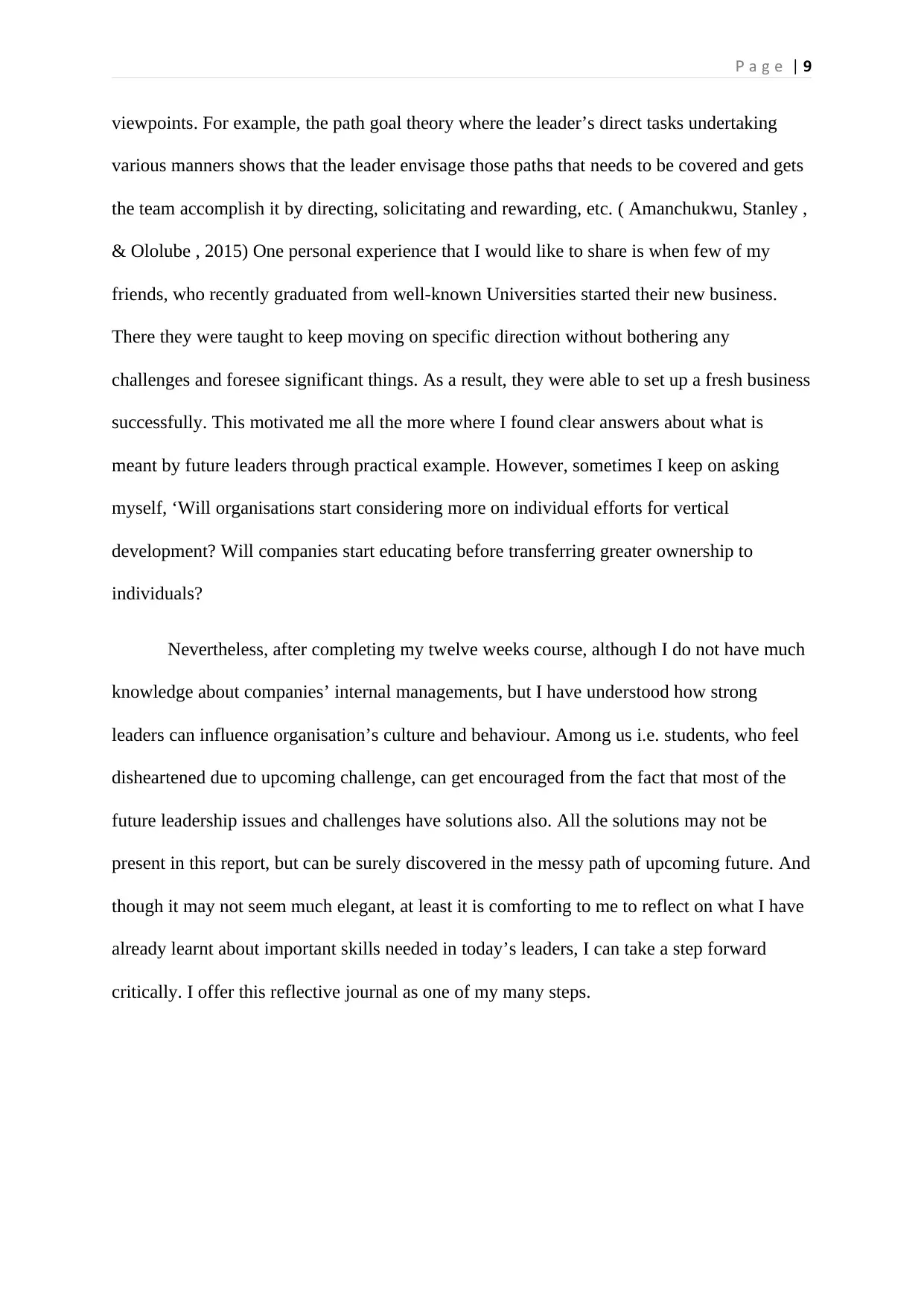
a g eP | 9
viewpoints. For example, the path goal theory where the leader’s direct tasks undertaking
various manners shows that the leader envisage those paths that needs to be covered and gets
the team accomplish it by directing, solicitating and rewarding, etc. ( Amanchukwu, Stanley ,
& Ololube , 2015) One personal experience that I would like to share is when few of my
friends, who recently graduated from well-known Universities started their new business.
There they were taught to keep moving on specific direction without bothering any
challenges and foresee significant things. As a result, they were able to set up a fresh business
successfully. This motivated me all the more where I found clear answers about what is
meant by future leaders through practical example. However, sometimes I keep on asking
myself, ‘Will organisations start considering more on individual efforts for vertical
development? Will companies start educating before transferring greater ownership to
individuals?
Nevertheless, after completing my twelve weeks course, although I do not have much
knowledge about companies’ internal managements, but I have understood how strong
leaders can influence organisation’s culture and behaviour. Among us i.e. students, who feel
disheartened due to upcoming challenge, can get encouraged from the fact that most of the
future leadership issues and challenges have solutions also. All the solutions may not be
present in this report, but can be surely discovered in the messy path of upcoming future. And
though it may not seem much elegant, at least it is comforting to me to reflect on what I have
already learnt about important skills needed in today’s leaders, I can take a step forward
critically. I offer this reflective journal as one of my many steps.
viewpoints. For example, the path goal theory where the leader’s direct tasks undertaking
various manners shows that the leader envisage those paths that needs to be covered and gets
the team accomplish it by directing, solicitating and rewarding, etc. ( Amanchukwu, Stanley ,
& Ololube , 2015) One personal experience that I would like to share is when few of my
friends, who recently graduated from well-known Universities started their new business.
There they were taught to keep moving on specific direction without bothering any
challenges and foresee significant things. As a result, they were able to set up a fresh business
successfully. This motivated me all the more where I found clear answers about what is
meant by future leaders through practical example. However, sometimes I keep on asking
myself, ‘Will organisations start considering more on individual efforts for vertical
development? Will companies start educating before transferring greater ownership to
individuals?
Nevertheless, after completing my twelve weeks course, although I do not have much
knowledge about companies’ internal managements, but I have understood how strong
leaders can influence organisation’s culture and behaviour. Among us i.e. students, who feel
disheartened due to upcoming challenge, can get encouraged from the fact that most of the
future leadership issues and challenges have solutions also. All the solutions may not be
present in this report, but can be surely discovered in the messy path of upcoming future. And
though it may not seem much elegant, at least it is comforting to me to reflect on what I have
already learnt about important skills needed in today’s leaders, I can take a step forward
critically. I offer this reflective journal as one of my many steps.
Secure Best Marks with AI Grader
Need help grading? Try our AI Grader for instant feedback on your assignments.
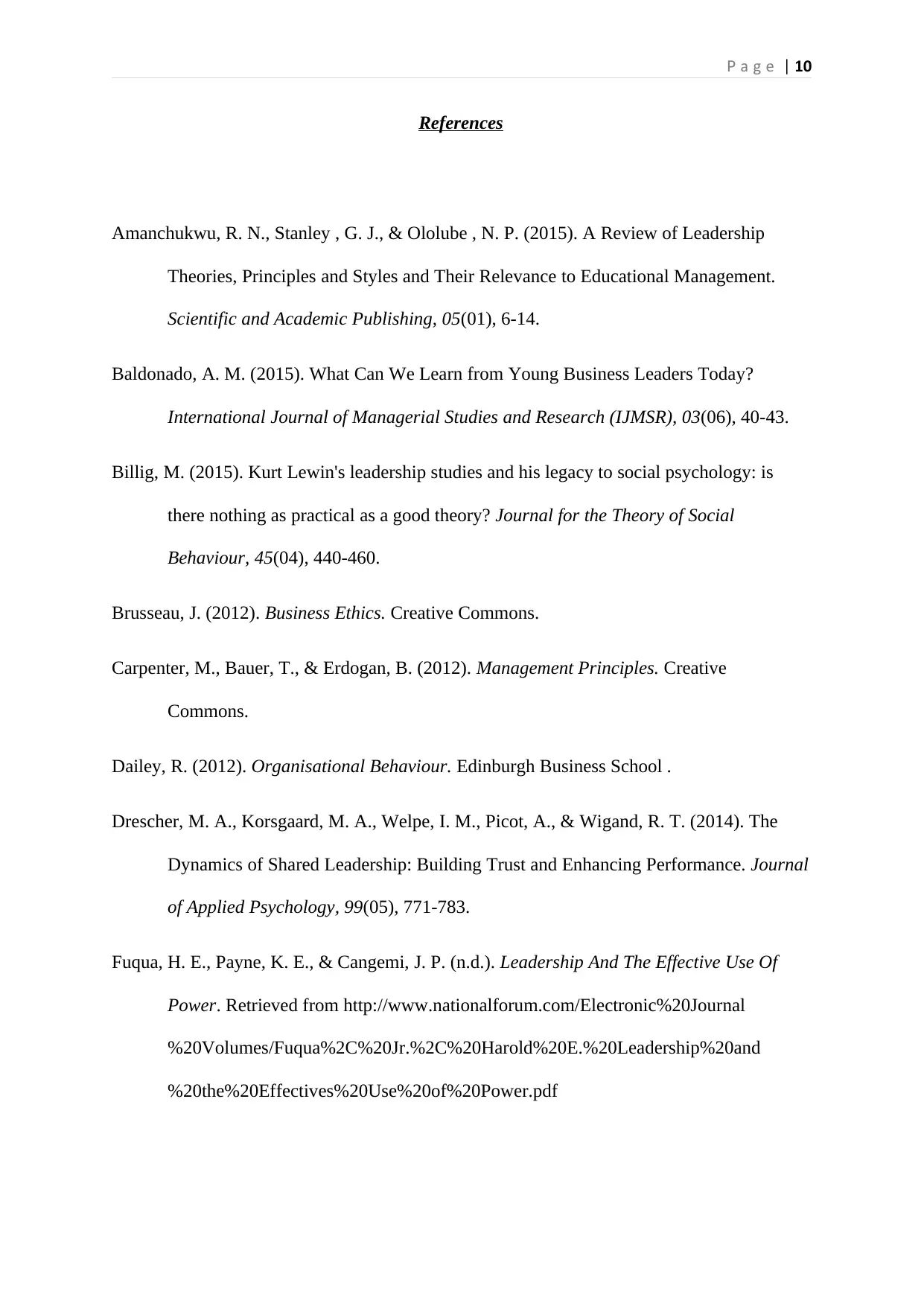
a g eP | 10
References
Amanchukwu, R. N., Stanley , G. J., & Ololube , N. P. (2015). A Review of Leadership
Theories, Principles and Styles and Their Relevance to Educational Management.
Scientific and Academic Publishing, 05(01), 6-14.
Baldonado, A. M. (2015). What Can We Learn from Young Business Leaders Today?
International Journal of Managerial Studies and Research (IJMSR), 03(06), 40-43.
Billig, M. (2015). Kurt Lewin's leadership studies and his legacy to social psychology: is
there nothing as practical as a good theory? Journal for the Theory of Social
Behaviour, 45(04), 440-460.
Brusseau, J. (2012). Business Ethics. Creative Commons.
Carpenter, M., Bauer, T., & Erdogan, B. (2012). Management Principles. Creative
Commons.
Dailey, R. (2012). Organisational Behaviour. Edinburgh Business School .
Drescher, M. A., Korsgaard, M. A., Welpe, I. M., Picot, A., & Wigand, R. T. (2014). The
Dynamics of Shared Leadership: Building Trust and Enhancing Performance. Journal
of Applied Psychology, 99(05), 771-783.
Fuqua, H. E., Payne, K. E., & Cangemi, J. P. (n.d.). Leadership And The Effective Use Of
Power. Retrieved from http://www.nationalforum.com/Electronic%20Journal
%20Volumes/Fuqua%2C%20Jr.%2C%20Harold%20E.%20Leadership%20and
%20the%20Effectives%20Use%20of%20Power.pdf
References
Amanchukwu, R. N., Stanley , G. J., & Ololube , N. P. (2015). A Review of Leadership
Theories, Principles and Styles and Their Relevance to Educational Management.
Scientific and Academic Publishing, 05(01), 6-14.
Baldonado, A. M. (2015). What Can We Learn from Young Business Leaders Today?
International Journal of Managerial Studies and Research (IJMSR), 03(06), 40-43.
Billig, M. (2015). Kurt Lewin's leadership studies and his legacy to social psychology: is
there nothing as practical as a good theory? Journal for the Theory of Social
Behaviour, 45(04), 440-460.
Brusseau, J. (2012). Business Ethics. Creative Commons.
Carpenter, M., Bauer, T., & Erdogan, B. (2012). Management Principles. Creative
Commons.
Dailey, R. (2012). Organisational Behaviour. Edinburgh Business School .
Drescher, M. A., Korsgaard, M. A., Welpe, I. M., Picot, A., & Wigand, R. T. (2014). The
Dynamics of Shared Leadership: Building Trust and Enhancing Performance. Journal
of Applied Psychology, 99(05), 771-783.
Fuqua, H. E., Payne, K. E., & Cangemi, J. P. (n.d.). Leadership And The Effective Use Of
Power. Retrieved from http://www.nationalforum.com/Electronic%20Journal
%20Volumes/Fuqua%2C%20Jr.%2C%20Harold%20E.%20Leadership%20and
%20the%20Effectives%20Use%20of%20Power.pdf
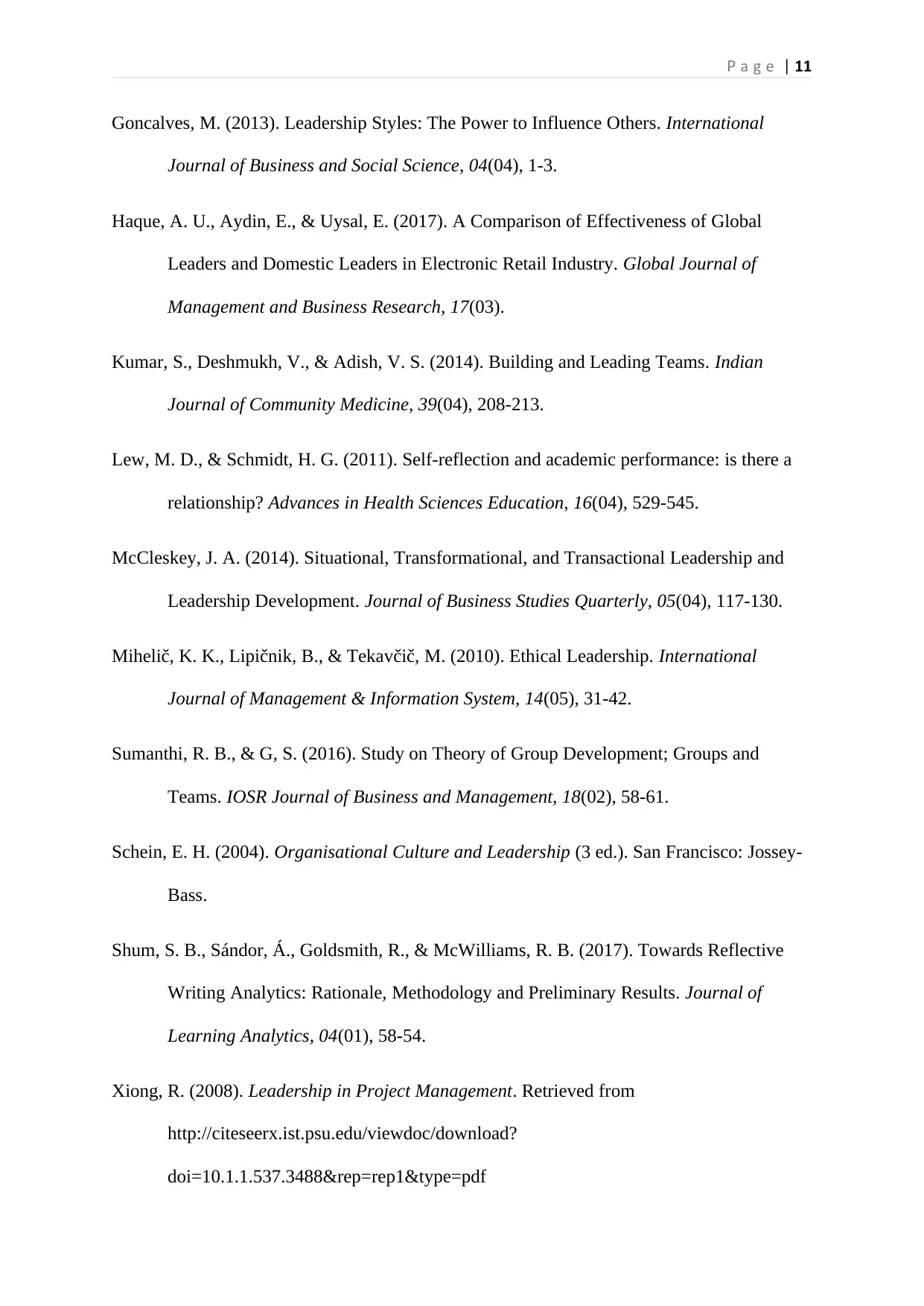
a g eP | 11
Goncalves, M. (2013). Leadership Styles: The Power to Influence Others. International
Journal of Business and Social Science, 04(04), 1-3.
Haque, A. U., Aydin, E., & Uysal, E. (2017). A Comparison of Effectiveness of Global
Leaders and Domestic Leaders in Electronic Retail Industry. Global Journal of
Management and Business Research, 17(03).
Kumar, S., Deshmukh, V., & Adish, V. S. (2014). Building and Leading Teams. Indian
Journal of Community Medicine, 39(04), 208-213.
Lew, M. D., & Schmidt, H. G. (2011). Self-reflection and academic performance: is there a
relationship? Advances in Health Sciences Education, 16(04), 529-545.
McCleskey, J. A. (2014). Situational, Transformational, and Transactional Leadership and
Leadership Development. Journal of Business Studies Quarterly, 05(04), 117-130.
Mihelič, K. K., Lipičnik, B., & Tekavčič, M. (2010). Ethical Leadership. International
Journal of Management & Information System, 14(05), 31-42.
Sumanthi, R. B., & G, S. (2016). Study on Theory of Group Development; Groups and
Teams. IOSR Journal of Business and Management, 18(02), 58-61.
Schein, E. H. (2004). Organisational Culture and Leadership (3 ed.). San Francisco: Jossey-
Bass.
Shum, S. B., Sándor, Á., Goldsmith, R., & McWilliams, R. B. (2017). Towards Reflective
Writing Analytics: Rationale, Methodology and Preliminary Results. Journal of
Learning Analytics, 04(01), 58-54.
Xiong, R. (2008). Leadership in Project Management. Retrieved from
http://citeseerx.ist.psu.edu/viewdoc/download?
doi=10.1.1.537.3488&rep=rep1&type=pdf
Goncalves, M. (2013). Leadership Styles: The Power to Influence Others. International
Journal of Business and Social Science, 04(04), 1-3.
Haque, A. U., Aydin, E., & Uysal, E. (2017). A Comparison of Effectiveness of Global
Leaders and Domestic Leaders in Electronic Retail Industry. Global Journal of
Management and Business Research, 17(03).
Kumar, S., Deshmukh, V., & Adish, V. S. (2014). Building and Leading Teams. Indian
Journal of Community Medicine, 39(04), 208-213.
Lew, M. D., & Schmidt, H. G. (2011). Self-reflection and academic performance: is there a
relationship? Advances in Health Sciences Education, 16(04), 529-545.
McCleskey, J. A. (2014). Situational, Transformational, and Transactional Leadership and
Leadership Development. Journal of Business Studies Quarterly, 05(04), 117-130.
Mihelič, K. K., Lipičnik, B., & Tekavčič, M. (2010). Ethical Leadership. International
Journal of Management & Information System, 14(05), 31-42.
Sumanthi, R. B., & G, S. (2016). Study on Theory of Group Development; Groups and
Teams. IOSR Journal of Business and Management, 18(02), 58-61.
Schein, E. H. (2004). Organisational Culture and Leadership (3 ed.). San Francisco: Jossey-
Bass.
Shum, S. B., Sándor, Á., Goldsmith, R., & McWilliams, R. B. (2017). Towards Reflective
Writing Analytics: Rationale, Methodology and Preliminary Results. Journal of
Learning Analytics, 04(01), 58-54.
Xiong, R. (2008). Leadership in Project Management. Retrieved from
http://citeseerx.ist.psu.edu/viewdoc/download?
doi=10.1.1.537.3488&rep=rep1&type=pdf

a g eP | 12
1 out of 13
Related Documents
Your All-in-One AI-Powered Toolkit for Academic Success.
+13062052269
info@desklib.com
Available 24*7 on WhatsApp / Email
![[object Object]](/_next/static/media/star-bottom.7253800d.svg)
Unlock your academic potential
© 2024 | Zucol Services PVT LTD | All rights reserved.




